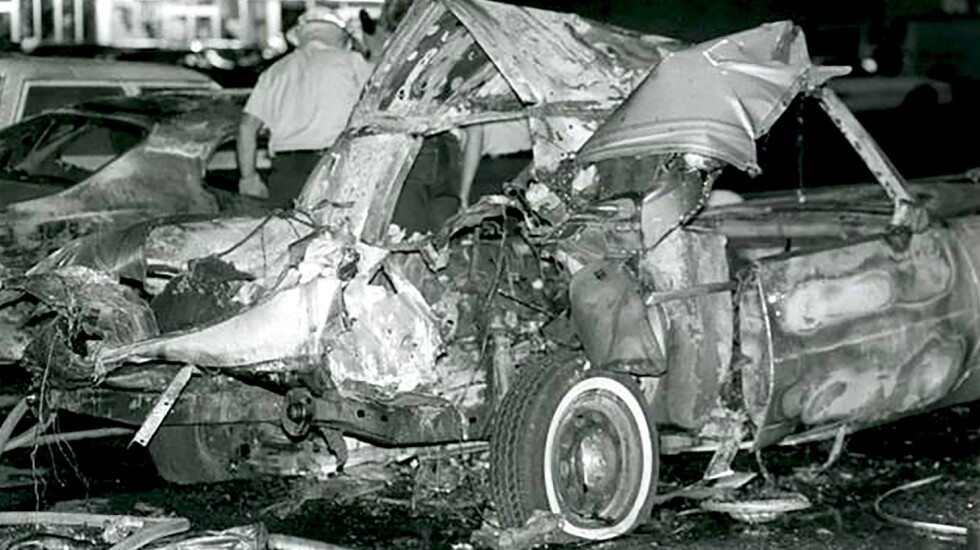
LAS VEGAS — After the boom, a man staggered from a Cadillac and looked smoky, his hair standing on end. “They’re trying to kill me,” he yelled in the parking lot. “They’re trying to kill me!”
A passer-by on East Sahara, United Press International Las Vegas bureau chief Myram Borders, asked, “Who is trying to kill you?”
Frank “Lefty” Rosenthal clammed up.
You’re having a rough night, tough ex-Nevada Gov. Mike O’Callaghan, having just left Tony Roma’s, told him.
Forty years ago Tuesday, Rosenthal’s 1981 Cadillac Eldorado exploded when the Stardust sportsbook chief turned the ignition key in the lot shared by Tony Roma’s and a Marie Callender’s.
Somehow, in a miracle — how Rosenthal later described it — chronicled in the movie “Casino,” he survived. During a brief hospital stay, he’d tell detectives nothing.
Oddsmaker Vinny Magliulo, then at the Barbary Coast, said the surprise wasn’t the explosion, “but that [Rosenthal] survived … that car was so charred, by the grace of God anyone got out of that.”
It’s a notorious Vegas cold case. Today, Marie Callender’s is shuttered. A Hustler Hollywood adult novelty store occupies the Tony Roma’s edifice.
Vegas sports-betting pillar Roxy Roxborough wrote, in an email from Thailand, “The neighborhood is more dangerous now.” He added, “It’s been 40 years, and there still are some things I would rather not say about it.”
Someone aware of Rosenthal improperly running casinos without a license, his skimming capers and legal ploys, cut to the blunt point about harm being inflicted upon him.
“I was surprised it took that long.”
LUCKY LEFTY
A few nights a week, Rosenthal gathered with bookmaking pals Marty Kane, Ruby Goldstein and Stanley Green at Tony Roma’s.
That Monday, no doubt the NFL strike was discussed between drinks. Rosenthal would order ribs to go, around 8. They’d disperse 30 minutes later, whenever his food was ready.
Rosenthal revealed plenty to Nicholas Pileggi, for his nonfiction “Casino” tome that would frame the movie, in which Robert De Niro’s Ace Rothstein portrays Lefty.
That ’81 Eldorado had a quirk, a steel plate under the driver’s side to stabilize a weight imbalance. Investigators determined that would direct an explosive device up and back, rather than up and forward.
Three-inch flames, licking from the car’s defroster vents, first told Rosenthal something was amiss. He thought, “Why is my car on fire?”
He was slammed against the steering wheel. He struggled to exit. Fire filled the cabin. He rolled on the pavement to snuff out burning clothes.
Two Secret Service agents, in the area for a visit by President Ronald Reagan, forced him to the ground, urging him to cover his head and stay calm.
The gas tank ignited, triggering an explosion, Lefty said, “like an atom bomb.” The two-ton Eldorado hopped several feet, Pileggi wrote, a 50-foot fireball of metal and plastic shot into the air, “raining blackened shards and soot.”
When South Point sportsbook director Chris Andrews wrote tickets at the Stardust, he often chatted with a security guard who’d boast about Rosenthal giving him $100 every time he started his new Cadillac.
“This poor, dumb bastard,” Andrews wrote in his “Then One Day” book. “I never told him, either.”
DECADES OF QUESTIONS
Rosenthal pal Tony Spilotro topped a culprit list. Bad blood had been boiling between them since Spilotro’s affair with Lefty’s estranged wife Geri. Biker-thug friends of hers were also implicated.
Mob associates in Kansas City, Milwaukee, Cleveland and Chicago also were in the mix, from Rosenthal’s misdirected skims or his alleged status as an FBI squealer.
Pileggi noted Rosenthal’s possible role as a Top Echelon informant for the FBI since his days as a prominent Chicago bookmaker. Lefty landed in Vegas in 1968, ran the Rose Bowl book and took over the Stardust and other properties.
When Lefty learned handicapper Pete White was behind consistent winners, he wanted to hire White. But Pete, 82, told son and second-generation oddsman Kenny White that those questionable connections made him pass.
Rosenthal also hosted a late-night TV talk show on irregular Saturdays. “It was good,” Magliulo said. “Rosenthal was eloquent and dressed sharp. [Frank] Sinatra did it, and I think I saw Robert Conrad.”
According to Pileggi, the FBI was after Milwaukee capo Frank “Mad Bomber” Balistrieri due to his penchant for blowing up foes.
Nonsense, South Point owner Michael Gaughan told me in 2018 when I interviewed him extensively for a 2019 sports-betting book.
“It was the Chicago people,” Gaughan said. “This was the gang that couldn’t shoot straight. They put the bomb in the wrong spot.”
Frank Cullotta, a Chicago native who ran with Spilotro in Vegas, fingered Kansas City, led by Nick Civella, due to its demolition tendencies and strict adherence to omertà, which dealt harshly with those who talked.
In 1991, the Nevada Supreme Court upheld Rosenthal’s listing in the Black Book, barring him from entering a casino. He bolted to Southern California, then Florida. But he’d still visit Vegas, wearing disguises.
At 79, in 2008 in Miami Beach, Rosenthal died from heart-related issues.
Wayne Clingman, who wrote a book about Balistrieri, told me the Mob was not 100% certain of Lefty’s status as an informant:
“Many thought he was, Frank B being one of them. Frank B had a bad temper. One guy he hated was blown up. No, I don’t know for sure [about Rosenthal]. We can only speculate.”







